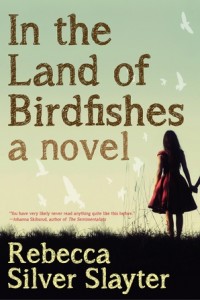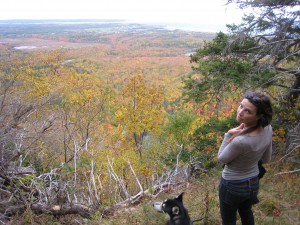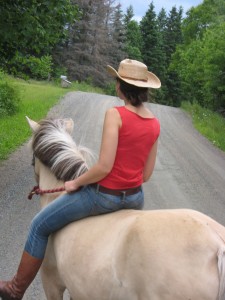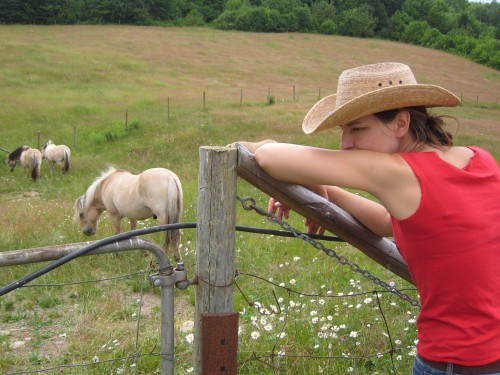“Now I watch it go by like a passing train, each car in sequence: hesitation, uncertainty, self-doubt, total panic, questioning of self-worth, and regretting of every act I’ve undertaken during my time on earth … and then one good sentence. And then a scene that has my fingers hurrying on the keys, struggling to keep up with the unfolding action, following it as closely and eagerly as if I were in it, excited to see what will happen next, and what will happen after that.” — Rebecca Silver Slayter, author of In the Land of Birdfishes
Rebecca, as a writer, do you plan and outline, or do you write to find your story?
 I am still determining what process works best for me in this regard. With In the Land of Birdfishes, I was told by many people that the best process was to plan very little, leaving me free to follow the story wherever it should take me. But that strategy terrified me. I was sure without a map of some kind, I’d get lost somewhere in the novel and find myself with no way out or back. And so in many ways, my planning of Birdfishes was motivated by fear, which is not typically a good basis for decision making. But in this case, I think it was a good strategy. My inner critic is a noisy and nasty one; I found she was best silenced by the reminder that I knew where I was going, even if I’d momentarily lost my way, and I found that the excitement of getting to an ending I looked forward to writing kept me progressing forward even during chapters where I lost my footing. The chapters I had planned most thoroughly were always the best ones and the ones I enjoyed writing most.
I am still determining what process works best for me in this regard. With In the Land of Birdfishes, I was told by many people that the best process was to plan very little, leaving me free to follow the story wherever it should take me. But that strategy terrified me. I was sure without a map of some kind, I’d get lost somewhere in the novel and find myself with no way out or back. And so in many ways, my planning of Birdfishes was motivated by fear, which is not typically a good basis for decision making. But in this case, I think it was a good strategy. My inner critic is a noisy and nasty one; I found she was best silenced by the reminder that I knew where I was going, even if I’d momentarily lost my way, and I found that the excitement of getting to an ending I looked forward to writing kept me progressing forward even during chapters where I lost my footing. The chapters I had planned most thoroughly were always the best ones and the ones I enjoyed writing most.
With the novel I’m finishing now, I am a little braver, so I began with very little of a plan, only a relationship and situation I wanted to explore. As I went along I defined more details, the chapters ahead becoming increasingly clear as I approached them. And I’ve enjoyed this increased freedom, though I suspect it will mean a broader and more intensive edit lies ahead before I will be ready to show my novel to anyone else. I suspect that’s the typical trade-off: planning speeds and steadies the process, while freeing yourself to explore may result in a longer journey but offers wonderful discoveries along the way.
Ultimately, I suspect what I will find is that I like the same balance in writing a novel that I like in life (where I balance the predictability of freelance editing work with the liberty of fiction writing): a reliable but flexible structure within which I can wander very freely.
What inspirations for your writing, if any, have come from unlikely sources?
You know, I think my inspirations tend to come from rather likely sources … That is to say, I tend to draw from the things I see and hear around me — like my mother, an ophthalmologist, telling me about a young patient who forever lost her ability to see due to neglected cataracts, or the story of my father spending all his savings in silver coins on his first date with my mother. (See excerpt from an essay below for more on the latter. Both of these memories contributed to the story that unfolds in the first chapter of Birdfishes.) But typically I try to work against using that material so directly — which has certain advantages: I have been surprised, upon being published, to learn how many people look to your own biography and life for the source of what you’ve written. My parents are, I think, rather relieved that when friends or colleagues have asked them, on multiple occasions, which characters they are in my novel, they could answer that none of the characters were modelled after anyone I know.
Of course I don’t think there’s anything wrong with writing from life, but for whatever reason, I find I like to digest personal experience fairly well before it surfaces in some new, less recognizable form in my writing. The most common source of inspiration for me is experiencing, reading about, or hearing of an event and then imagining what would have happened if it had turned out some other way. I’m a hopeless daydreamer, and my daydreams often begin with some real happening, vanish down a long path of “what if,” and then emerge, occasionally, as a story I want to tell.
Which aspect or aspects of writing do you enjoy most?
Before writing Birdfishes, I always enjoyed the editing stage the most. There’s something very powerful about sitting down with something rough, and making it beautiful. In this case, however, to my surprise, I found editing very challenging. I had the most wonderful editors in the world (yourself emphatically included), and so it certainly had nothing to do with the process. But trying to maintain perspective on something so big, which you’ve worked on for so long, was difficult. And I made a few major changes — cutting one of the most prominent characters, for instance — that were unexpectedly painful. You have to have a certain ruthlessness to edit your own work well, to be willing to part with characters who seem real to you without feeling like you’ve committed some sort of murder, to make the difficult decisions to cut whole chapters you love or worked hard on. It’s like performing surgery on yourself (which is why having talented and clear-eyed editors to guide you through it all is so critical).
And so, to my surprise, what I loved most were the beginning and end stages of writing/publishing Birdfishes. I loved the research, the places I went, the books I read, the stage when I was learning so much and believed that every new fact or perspective I encountered might find a home in the book. I loved the nights at my desk, writing it, page by page. I LOVED the moment of beginning to work with my editors at HarperCollins Canada, suddenly having a partner in telling this story, in making the hard choices. But maybe my favourite thing of all is the very last stage of writing a book: when I come across readers to whom my book really meant something. It is truly a gift to be able to have that relationship with a stranger — I know what it’s like to be at the other end of that gift, how certain books have affected me and my life. To think of having even the possibility of offering that to another reader is almost overwhelming. I feel very lucky.
Your husband believed in you as a writer and helped restore your faith in yourself. What advice would you give to writers who face a crisis of confidence?
 First, from my experience of my husband’s support, I learned that there is nothing more valuable than having people around you whose faith in your writing is solid as steel, and will steady your own when it quakes. If you don’t happen to have such people among your immediate friends and family, seek them out in writing groups or classes. I also think it’s valuable to take your time — accept that it may take more years to begin than you’d hoped, and more days to finish than you’d expected. But nothing is wasted. The years you aren’t writing, or aren’t writing what you want, or aren’t finishing what you start are all productive. You’re gathering ideas, noticing the world, growing confidence and resolve, and readying yourself.
First, from my experience of my husband’s support, I learned that there is nothing more valuable than having people around you whose faith in your writing is solid as steel, and will steady your own when it quakes. If you don’t happen to have such people among your immediate friends and family, seek them out in writing groups or classes. I also think it’s valuable to take your time — accept that it may take more years to begin than you’d hoped, and more days to finish than you’d expected. But nothing is wasted. The years you aren’t writing, or aren’t writing what you want, or aren’t finishing what you start are all productive. You’re gathering ideas, noticing the world, growing confidence and resolve, and readying yourself.
A writer I respect once warned a class of young writing students not to publish too early. I know many talented writers who wrote wonderful books at young ages. But I know I personally would regret forever whatever book I could have written at twenty. It took me time to decide the story I wanted to tell and to develop the experience and ability to tell it. I wish now I’d been more patient with myself then, because everything I did and saw in those years is valuable to the writer I am now. As a writer, there’s a lot of work that’s productive besides sitting at your computer, typing letters. The hours lost to staring out a window, reading, daydreaming, living, are the ore you’re mining once you’re at your desk again. I didn’t know that at the time.
Seemingly at odds with that last advice, I also think it’s important to keep writing, in whatever way you can, at whatever rate, even when you feel stuck or struggling. This will mean different things for different people — maybe writing for an hour, or ten minutes every day, however many pages result. Maybe writing a certain number of words a day, even if only a single sentence. Maybe keeping a journal, while putting aside the novel or poem that is giving you trouble. Keeping the writing energy vital and engaged, even when it’s being redirected to other purposes, is useful.
And last, if you find it difficult to begin or complete projects, install some sort of structure in your life that will demand work of you. This might be a writing class, or a writing group, or a friend who agrees to berate you if you don’t send her a new piece of work every month. Once I had made the decision to write Birdfishes, taking workshops in Montreal and meeting with a monthly writing group helped reinforce my own motivation when it faltered.
Was there anything about being a full-time writer, part of the learning curve, that came as a surprise to you?
There are three things I’ve learned that I value most. The first is about writing as a profession, and it’s just this: that it’s possible.
I had extraordinary support all my life in my desire to write: from a very young age, I was encouraged by my parents and my teachers. However, I had no real model of what it would mean to write as a career. The grown-ups I knew were doctors or farmers or librarians or babysitters. When I was about eleven, I met a writer for the first time. The wonderful children’s writer Sheree Fitch came to visit my grade five class and taught us, among other things, that each time she sold a book she made less than $2. Even at that age, when I had no idea what a house cost, or a car, and was not responsible for any bills of any kind, I understood that $2 would not go very far toward paying them. I also heard from the world at large, over and over again, about how hopeless a living writing was, how naive it would be to pursue it as more than a hobby.
It wasn’t until I was in my mid-twenties and working in publishing that I came to know other, much more experienced writers. And then I began to understand. It’s not easy, and you must make immediate peace with the unlikelihood of becoming a millionaire, but with hard work and talent, it is possible, in this country, to make a very modest living as a writer. I learned about grants, and teaching gigs, and freelance writing and editing opportunities. I discovered all the bits and pieces that you can stitch together until you arrive at the startlingly lovely situation of being a writer with a roof over your head.
The second thing — actually two things — I discovered are more about the craft and process of writing, and they’re directly at odds with each other.
(1) You can’t rush or force writing (at least I can’t). Many people will tell you to write a certain amount every day and push ahead no matter what. I remember very clearly the points in my book where I felt I had taken a wrong turn, but I was committed to a schedule of 500 words/day, and so I stumbled on until I’d found my way. But I cursed those memories for several years afterwards: in every case, the parts of the book I struggled most with fixing in editing were the parts I’d written in those moments. I realized, in retrospect, that pushing forward with something you’re unhappy with and thinking you’ll just resolve it later is like deciding you’ll fix the foundation of a skyscraper after you’ve put the roof on. Now if I feel real doubt about something I’m writing, I try to trust those instincts. Sometimes I need to take a few days off writing, or work on something else, or think more deeply about what I’m trying to do, or consider other possibilities. The answer to the problem, when it comes, is worth waiting for.
But …
(2) I’ve also learned that I come to doubt what I am writing — and the entire project, for extra fun — on a fixed routine as predictable and perpetual as the circling of the moon. The first times it happened with Birdfishes, I froze, certain I’d lost my way for good. But now, with the reassurance of experience, taught by habit and repetition, I know to expect and wait out that feeling. Now I watch it go by like a passing train, each car in sequence: hesitation, uncertainty, self-doubt, total panic, questioning of self-worth and regretting of every act I’ve undertaken during my time on earth … and then one good sentence. And then a scene that has my fingers hurrying on the keys, struggling to keep up with the unfolding action, following it as closely and eagerly as if I were in it, excited to see what will happen next, and what will happen after that. So there’s a time to trust your instincts and pause to reconsider the choices you’ve made before cementing them with every plot event that follows. But there’s also a time to hush those doubts and proceed, trusting that you will get to the place you need to be and can erase any missteps along the way. With experience comes the ability to tell the difference. (At least I hope so!)
In Rebecca’s essay “Storytelling and the Eloquent Error,” she wrote (and I share with her permission here):
“When I was a little girl, my parents told me the story of their courtship. How the night they first went out together, my father spent his life’s savings: a jar of silver dollars that his godmother had sent him every birthday and Christmas since he was born. How when my mother opened her door that evening, he stood in the lamplight with a jar of silver in his arms. I imagined he’d wanted this truth to be visible: how precious that first evening with her was, so precious it required a more extraordinary currency. Or maybe he’d hoped there might be some sympathetic magic in purchasing an evening with a woman named Margaret Silver with silver coins.
This is a truth from my life that I wrote into In the Land of Birdfishes, and it wasn’t until my parents heard me read those pages that I learned it wasn’t a truth at all. My father had indeed spent his silver savings that night, but not in the flamboyant way I imagined. Earlier that day, he’d carried the jar to the bank and cashed it all in. The gesture was real, but not that figure of my father’s earnest sacrifice, waiting for my mother at the door, full of hope, clutching those coins. Somehow, in my imagination, that embellishment had sprung out of the truth, the weeds of myth overtaking the family garden, to borrow a metaphor from Bruno Schulz.
Story is a powerful tool, central to our sense of identity, as individuals, families, cultures, and nations. Story is how we summarize the complexity of life and what we value in it, and it’s how we communicate those perspectives to others. But story is often filled with a kind of eloquent error: I better understood how my father felt about my mother, what he gave her and what he gave up for her, when I imagined him at her door with everything he had in his hands. This type of error, whether intentional or not, can perform an important service in storytelling. In Birdfishes, Jason distorts events to express his experience of them, or to conceal what he prefers to hide. He can better explain the devastation of losing Angel with the image of his house burned to the ground, just as the jar of coins better expressed my father’s sacrifice. And so there’s insight in these lies — while stories often fail to reveal the world the story tells of, they always, in some way, expose the storyteller.”
♦ ♦ ♦
 REBECCA SILVER SLAYTER grew up in New Glasgow, an old industrial town in northern Nova Scotia. The daughter of a psychiatrist and an ophthalmologist, she was the eldest of three sisters. As a child and adolescent, Rebecca studied music, art, dance, and theatre, read and wrote feverishly, and dreamed of escaping to the kinds of places she’d read about in books. Rebecca studied drama and English at the University of Toronto, and during a summer study-abroad program, met her husband, Conrad Taves, a student of architecture.
REBECCA SILVER SLAYTER grew up in New Glasgow, an old industrial town in northern Nova Scotia. The daughter of a psychiatrist and an ophthalmologist, she was the eldest of three sisters. As a child and adolescent, Rebecca studied music, art, dance, and theatre, read and wrote feverishly, and dreamed of escaping to the kinds of places she’d read about in books. Rebecca studied drama and English at the University of Toronto, and during a summer study-abroad program, met her husband, Conrad Taves, a student of architecture.
Upon graduation, she pursued work in publishing, interning at Quill & Quire and The Walrus before taking a position as Managing Editor at Brick literary journal. After leaving Brick to return to grad school, she travelled to Dawson City, researching the novel that would become In the Land of Birdfishes. She left Dawson for Montreal, where she studied English and creative writing at Concordia University. By the time she finished her M.A., she had a draft of In the Land of Birdfishes, for which she received the David McKeen Award for Best Creative Writing Thesis. That spring, she drove with Conrad to Cape Breton, Nova Scotia, where they had bought an old farmhouse on a tiny lake between the highlands and the sea. There, he runs an architectural design and planning practice, while she works as a freelance writer and editor, and is currently completing a second novel.

What a great interview!